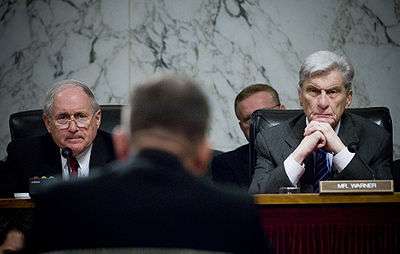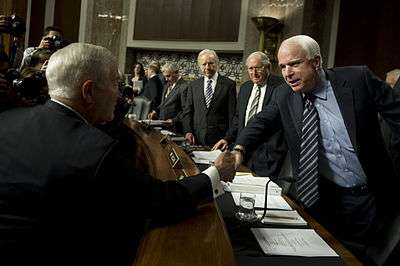United States Senate Committee on Armed Services
_the_Honorable_Ray_Mabus.jpg)
In June 2009, Armed Services Committee senators
Joe Lieberman,
Carl Levin (chair), and
John McCain, listen to Secretary of the Navy
Ray Mabus deliver his opening remarks for the fiscal year 2010 budget request in June 2009.

Hearing on sexual assault in the military, June 4, 2013
The Committee on Armed Services (sometimes abbreviated SASC for Senate Armed Services Committee on its Web site) is a committee of the United States Senate empowered with legislative oversight of the nation's military, including the Department of Defense, military research and development, nuclear energy (as pertaining to national security), benefits for members of the military, the Selective Service System and other matters related to defense policy. The Armed Services Committee was created as a result of the Legislative Reorganization Act of 1946 following U.S. victory in the Second World War. It merged the responsibilities of the Committee on Naval Affairs (established in 1816) and the Committee on Military Affairs (also established in 1816).
Considered one of the most powerful Senate committees, its broad mandate allowed it to report some of the most extensive and revolutionary legislation during the Cold War years, including the National Security Act of 1947. The committee tends to take a more bipartisan approach than other committees, as many of its members formerly served in the military or have major defense interests located in the states they come from.[1]
Jurisdiction
According to the Standing Rules of the United States Senate, all proposed legislation, messages, petitions, memorials, and other matters relating to the following subjects are referred to the Armed Services Committee:[2]
- Aeronautical and space activities pertaining to or primarily associated with the development of weapons systems or military operations.
- Common defense.
- Department of Defense, the Department of the Army, the Department of the Navy, and the Department of the Air Force, generally.
- Maintenance and operation of the Panama Canal, including administration, sanitation, and government of the Canal Zone.
- Military research and development.
- National security aspects of nuclear energy.
- Naval petroleum reserves, except those in Alaska.
- Pay, promotion, retirement, and other benefits and privileges of members of the Armed Forces, including overseas education of civilian and military dependents.
- Selective service system.
- Strategic and critical materials necessary for the common defense.
Members, 114th Congress
| Majority |
Minority |
- John McCain, Arizona, Chairman
- Jim Inhofe, Oklahoma
- Jeff Sessions, Alabama
- Roger Wicker, Mississippi
- Kelly Ayotte, New Hampshire
- Deb Fischer, Nebraska
- Tom Cotton, Arkansas
- Mike Rounds, South Dakota
- Joni Ernst, Iowa
- Thom Tillis, North Carolina
- Dan Sullivan, Alaska
- Mike Lee, Utah
- Lindsey Graham, South Carolina
- Ted Cruz, Texas
|
- Jack Reed, Rhode Island Ranking Member
- Bill Nelson, Florida
- Claire McCaskill, Missouri
- Joe Manchin, West Virginia
- Jeanne Shaheen, New Hampshire
- Kirsten Gillibrand, New York
- Richard Blumenthal, Connecticut
- Joe Donnelly, Indiana
- Mazie Hirono, Hawaii
- Tim Kaine, Virginia
- Angus King, Maine[3]
- Martin Heinrich, New Mexico
|
Source:
Subcommittees
Chairmen
Committee on Military Affairs, 1816–1947
Committee on Naval Affairs, 1816–1947
Committee on Armed Services, 1947–present
Historical committee rosters
See also
External links

_the_Honorable_Ray_Mabus.jpg)

